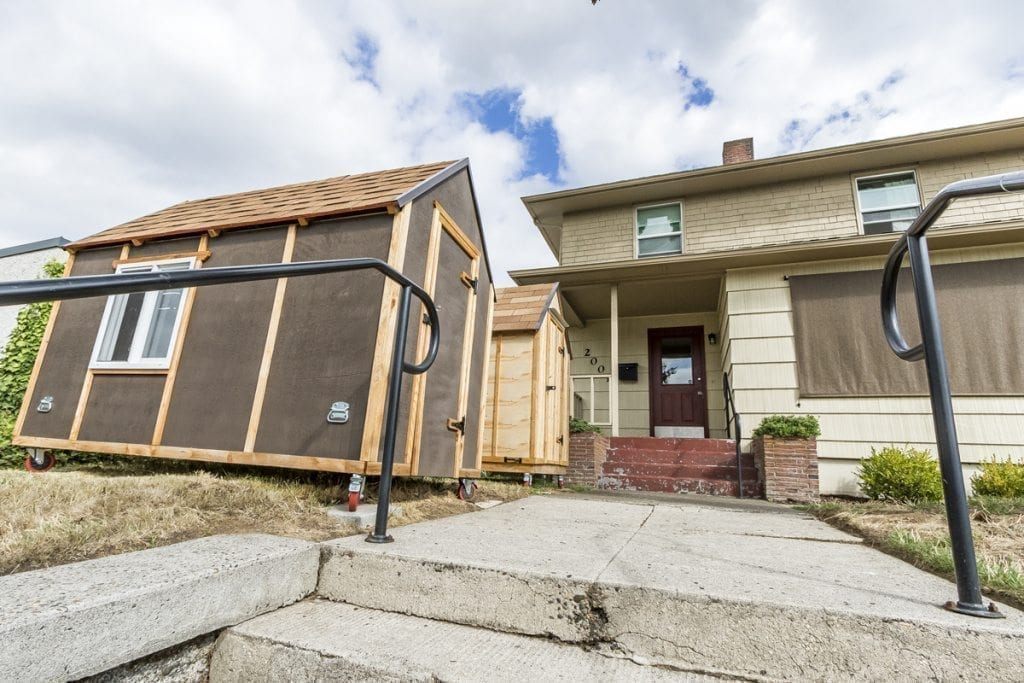VANCOUVER — One month after the majority of voters approved Vancouver’s affordable housing levy, city leaders are rolling out a timeline for taking applications, reviewing projects and awarding levy funds.
“Our goal is to have the policies and procedures available online by the end of this month,” Peggy Sheehan, the city’s community development program manager, told Vancouver city councilmembers this week, at the council’s workshop on Mon., Dec. 12. “We will try to have applications online in February and workshops for interested applicants in March.”
A review committee will meet in March and should review applications in April and May, Sheehan said. The committee’s funding recommendations will come before the Vancouver City Council in June and Sheehan said they hope to contract with the nonprofit and private partners by late summer of 2017.
The levy will collect a maximum of $6 million per year for seven years, and will help Vancouver increase its housing supply, prevent homelessness and save existing homes.
A large percentage of Vancouver voters — 57.6 percent — passed the levy in the Nov. 8 General Election.
“It passed by a pretty large margin and showed that residents care about affordable housing and trust the city to manage the funding,” Sheehan said.

The money collected will fund the following:
Administrative Costs: This will eat up 3 percent of the fund and pay for program oversight, monitoring and enforcement.
Increasing Housing Supply: This is where most of the money — 40 percent — would go. Using a competitive grant process, the levy would provide money to the Vancouver Housing Authority and both for-profit and nonprofit developers to build new affordable housing units. For-profit developers would be required to keep the affordable units for 20 years and the contract would tie the affordable-housing requirement to the land, requiring approval by the city council to get out of the agreement. Nonprofit developers would be required to keep the units as affordable housing, with rents adjusted for income, for the next 50 years.
Preventing Homelessness: Thirty percent of the money will help service providers who work with Vancouver’s most impoverished citizens provide rent vouchers and self-sufficiency services like cleaning up credit histories. Some of this money could be used to build more shelters to serve the area’s homeless citizens.
Preserving Existing Homes: An additional 27 percent of the levy funds would provide money through a competitive grant process to help make needed repairs on homes owned by people who earn less than half the average income in Vancouver. For a family of four, that threshold is $36,650 a year or less. This fund would provide a one-percent interest loan for people to make needed repairs on existing homes. The loan would be paid back into the fund when those homeowners sold their property.
Katie Archer, campaign manager for the non-partisan Bring Vancouver Home campaign advocating for Prop 1 said the levy had no organized opposition but did have a diverse group of supporters, including for-profit housing developers and nonprofit groups that work with Vancouver’s lowest income families and homeless populations.
“Faith-based groups, developers, nonprofits, they’ve all come together,” Archer told clarkcountytoday.com in October about the levy’s wide network of proponents.
The Vancouver City Council decided last summer to put Prop 1 on the ballot during the Nov. 8 General Election as an answer to Vancouver’s housing crisis.
“In the last five years, we’ve seen housing prices here go up by 38.3 percent,” Archer said. “There are 17,690 cost-burdened families in Vancouver who are spending more than one-third of their income on rent, and 6,855 families who are spending more than half of their income on rent.”
What’s more, Vancouver has an extremely low number of available rental units on the market, Archer says. In a healthy rental market, five to six percent of units are open and ready to rent. In Vancouver, only two percent of the rentals are empty and Archer says nearly all of those available rentals are priced in the medium-to-high range. For low-income families, seniors on fixed incomes, disabled individuals and even many working class families, Vancouver’s rental market offers very few housing options.
The new levy will serve the city of Vancouver’s lowest-income residents. Sheehan explained that the funds will go to households earning less than half of the area’s median income ($36,650 for a family of four).
The levy priorities affordable housing for seniors, families with children, people with disabilities, veterans and people who are experiencing homelessness. People served by the affordable housing levy must have lived in Vancouver for at least 30 days.
The city’s application review criteria will look at a number of things, Sheehan told the city councilmembers on Dec. 12, including: the number of affordable housing units provided, population served, possibilities for leveraging other dollars, maximizing affordability for low-income households and the feasibility of the proposed project.
Until the city starts to collect applications from nonprofit and private housing agencies and developers, Vancouver leaders won’t know what type of projects might be in the works. However, one thing that city councilmembers and Sheehan discussed on Dec. 12, was the urgency of using Prop 1 funds to help build a homeless shelter in Vancouver.
“We need to charge full steam ahead on a homeless shelter,” said Vancouver Mayor Tim Leavitt. “What we have now isn’t working and we need to have some semblance of a … shelter underway sooner rather than later. That’s my opinion.”
Sheehan said Monday that a city-organized task force on homelessness in Vancouver will convene again in January to discuss the possibility of a shelter, which could utilize funds from the Prop 1 levy, and other issues surrounding families and individuals experiencing homelessness in Vancouver.
For more information about the city of Vancouver’s ongoing efforts to address affordable housing, or to view the soon-to-be posted procedures and policies for the Prop 1 levy, visit the city’s affordable housing site.




